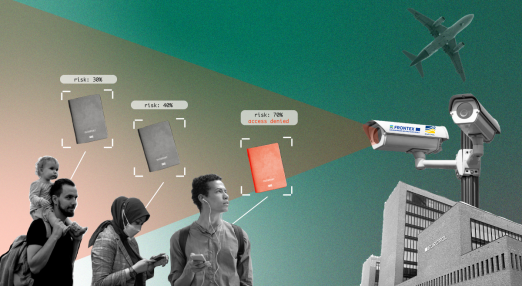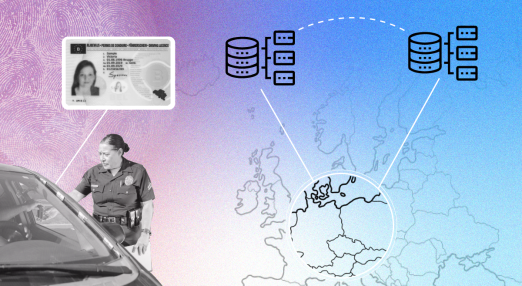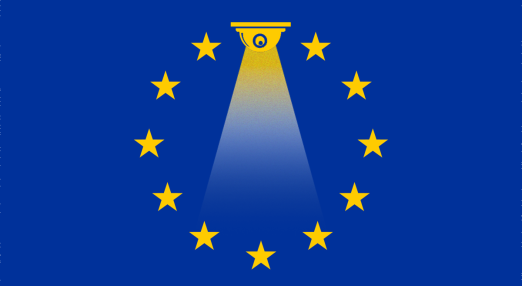policing
Filter by...
-

#PrivacyCamp24: Event summary
On January 24, 2024, we brought together policymakers, activists, human rights defenders, and academics from all over Europe for Privacy Camp 2024. We came together to explore the theme ‘Revealing, Rethinking, and Changing Systems’.
Read more
-

#PrivacyCamp23: Event summary
In January 2023, EDRi gathered policymakers, activists, human rights defenders, climate and social justice advocates and academics in Brussels to discuss the criticality of our digital worlds. We welcomed 200+ participants in person and enjoyed an online audience of 600+ people engaging with the event livestream videos. If you missed the event or want a reminder of what happened in a session, find the session summaries and video recordings below.
Read more
-

Police plans for the “future of travel” are for “a future with even more surveillance”
Plans hatched by Europol and Frontex to develop a “European System for Traveller Screening” that would require massive data processing and automated profiling have been condemned as ushering in “a future with even more surveillance” by German left MEP Cornelia Ernst, who told Statewatch that “the daily lives of millions of people” should not be shaped by “agencies that long ceased to be controllable by the public and the parliament.”
Read more
-

New EU law amplifies risks of state over-reach and mass surveillance
The EDRi network published its position paper on the proposed Regulation on automated data exchange for police cooperation (“Prüm II”). The European Commission’s Prüm II proposal fails to put in place vital safeguards designed to protect all of us from state overreach and authoritarian mass surveillance practices. In the worst case scenario, we may no longer be able to walk freely on our streets as the new law would treat large parts of the population as a criminal before proven otherwise.
Read more
-

Europol’s reform: A future data black hole in European policing
The European Parliament is soon due to vote on the powers expansion of the European Union’s law enforcement agency, Europol. Civil society has been extremely critical of Europol’s mandate revision, raising many concerns with regards to the lack of fundamental rights protections and policymakers’ blind and absolute trust in how the agency will use its new powers. All the more reasons to be worried: the result of the trilogue negotiations with the Council of the EU made it even worse.
Read more
-

Building the biometric state: Police powers and discrimination
This report examines the development and deployment of biometric identification technologies by police and border forces in Europe, and warns that the increasing use of the technology is likely to exacerbate existing problems with racist policing and ethnic profiling.
Read more
-

EU: Data retention strikes back? Options for mass telecoms surveillance under discussion again
In June 2021 the European Commission sought the views of member states on ways to reintroduce the bulk retention of telecoms traffic, location and internet connection data on everyone in the EU. Responses from seven member states, published here, show a divergence of views on what data to retain and when, but a majority in favour of new EU legislation.
Read more
-

EU ropes in intelligence agencies for enhanced border checks targeting Afghan nationals
Intensified border security checks targeting Afghan nationals have been agreed by the Council of the EU, with the procedures requiring the extraction of mobile phone data and significant coordination with national intelligence agencies – despite the EU having no competences in the realm of “national security”.
Read more
-

Algorithmic persecution based on massive privacy violations used to justify human rights abuses, says new report
More than 13,000 Turkish military personnel have been dismissed since July 2016 on the basis of an algorithm used by the authorities to assess the alleged “terrorist” credentials or connections of military officers and their relatives in violation of multiple human rights, says a new report published today by Statewatch.
Read more
-

Facial Recognition & Biometric Mass Surveillance: Document Pool
Despite evidence that public facial recognition and other forms of biometric mass surveillance infringe on a wide range EU fundamental rights, European authorities and companies are deploying these systems at a rapid rate. This has happened without proper consideration for how such practices invade people's privacy on an enormous scale; amplify existing inequalities; and undermine democracy, freedom and justice.
Read more
